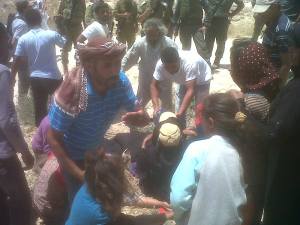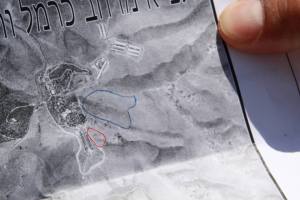Saturday July 7th, 2013. We’re called urgently to Umm al-Kheir. When we arrive, a woman is shouting and people from the village are running down the hill.
Abdallah starts running ahead of me with his big camera. He sprints incredibly quickly for this rough terrain. People and soldiers are scattered chaotically on the hill above the well of the village. A young shepherd of Umm al-Kheir, Sa’id (aliases throughout), is being howled into a military jeep. People gather around the jeep, the women scream to God in over-bearing agony. People sit in front of the vehicle and a soldier comes to stand in front of them and stop the jeep, signaling for it to go backwards in reverse. It sprints away but the crowd reaches it when it starts turning. A soldier, the same one that gave me that blow two weeks ago, pushes me off and digs his fingernails into my skin. Haj Ibrahim from Umm al-Kheir is brutally shoved off by Tarek Hussein, the Druze Border Police officer. The old Haj is thrown on the rocks on the side of the dirt road. The jeep drives off. The boy’s mother lays on the rocks in agony, another woman lays next to her. People call for water and yell “Allahu akbar” canonically.
The Ta’ayush comrades reproach the soldiers, “You’re amused?! It amuses you to separate a mother from her son?!” The commander procures a closed military zone to shoo us off. The map they present us bounds an area that is some 100 meters or more from where we’re at, but the soldiers are not taught to read their own maps. Ridiculously, they push us off in the direction they actually closed. Some of us decide to insist in protest and get arrested with the shepherd. Uriel is told he’ll be the first one to get arrested. “I can’t leave the people we’re accompanying on the ground like this, I’m with them,” he responds. I sit next to the women. I give Saul the camera I have thinking he won’t get arrested.They arrest him a minute later. G is taken too. As the soldiers haul my friends off, I get ready. Amidst the chaos, I drink some water, put my things out of my pockets and into the bag, and set my glasses firmly on my nose. Peacefulness. Blow to the shoulder. Sack of potatoes.
We exchange friendly looks. “Well, looks like we’re having a long day together,” I tell Saul.
“Sheket!” a soldier yells to silence us. “You’re not allowed to speak.” We occasionally defy this order, and he’s a little too eager to remind us of it for the rest of his stay with us. Later, at the station, he will obsessively remove and reinstall the cartridge of his weapon. Disturbingly reminiscent of Kubrick’s Full Metal Jacket.
On the hill, people are still scattered. The usual green-grey turtles with helmets and killing gear among the colorful Palestinians and activists. A Palestinian ambulance arrives to take care of Sa’id’s mother that is still collapsed on a rock. There’s some pushing around and shoving. Another Palestinian shepherd, Murad, is being taken by the soldiers. We’re all put in a vehicle. That’s it. The military has kidnapped their share for the day. We’re being taken away. At the other side of Carmel, Sa’id is brought to our vehicle. He is blindfolded and his hands are tied behind his back with a single zip-tie. It’s all removed when he’s put with us. He’s somewhat shaken. Looks around quickly. Looks ahead. Winces at the electric gate of the settlement. Rarely do Palestinians see it from this side. He rubs his wrists with relief. Military regulations require three zip-ties, but only few can demand it.
Not a word. Then a Border Policeman, a loud and friendly guy, a little chubby and with a kippah, starts filling up the arrest reports. The Hebron police station was somewhat “domesticated” by Ta’ayush over the years. They still do their job as occupiers and agents of apartheid, but they do it with a smile. Some of them, settlers themselves, prefer our company to that of the ultra-violent ideological settlers they have to deal with occasionally. The officer tells us our accusations and asks if we’re injured. He asks me to translate to Arabic and I use the opportunity to talk to Sa’id and reassure him. He’s in one shape, and the energetic zest returns to his often-smiling eyes. Murad was beaten and his left leg is hurt, but he refuses medical treatment.
This video shows a lot of the shoving, shouting, and other shenanigans, as well as the weirdness of the initial arrest of Sa’id. You may want to watch it all way through:
We’re accused of entering a closed military zone. These accusations shouldn’t be more than a detention. Sa’id is accused of trespassing, although he intentionally went way around the extension of the settlement Carmel. A couple of weeks ago the Haj was similarly arrested there, alone, and ended up spending several days in prison. When I just started coming to Ta’ayush, settlers would regularly attack the shepherds there and scatter the herds. Now the army does a better job for them, they go directly for the people in a way that doesn’t allow them to return. Accordingly, Sa’id avoided it, but with no avail. Visibility is arrestable. The military sterilizes the hills, to use the term used for the apartheid streets of Hebron (perhaps it’s tragically fitting that a toilet was confiscated there two weeks ago).

The map of the Closed Military Zone. The blue line shows
the area that was closed. The red line shows the area i
n which the military held the arrests. Photo: Amir
Murad’s charge is different. Tarek, the Druze officer, says he called him a Nazi, so Murad is accused of insulting a public servant. This kind of charge happens quite frequently. Gentle egos. Ezra recently won in court for allegedly insulting a commander by saying that the unit was committing war crimes. As for Murad, I can say with certainty, and with the risk of time-traveling back to kindergarten, that he did not call Tarek a Nazi. When we reach the station, the accusations change slightly, as the previous ones were not arrest-worthy. I refuse to sign all documents presented to me.
I met Murad during the first time I went to South Hebron Hills. He looks a lot like Sa’id – kind eyes, handsome, youthful smiling energy. I was stranded in Umm al-Kheir for a couple of hours that are sealed in my mind as particularly beautiful. That’s where my addiction to the sweet chai of the south began. I didn’t speak any Arabic at the time. He asks me now if I married since then. I didn’t. He’s getting married in three weeks, God’s willing. I congratulate him cordially. He learned English since our first encounter, so now we’re doing some language-tutoring exchange.
At the station, one is exposed to the absurdity of the law enforcement the Occupation engages with on a daily basis. A Palestinian man was arrested with his three year-old son. The man is handcuffed, and the kid follows him around, completely obfuscated. I think he was caught with the wrong documents in a vehicle with the wrong license plate and all in the wrong place.
“You’re so cute!” the cops yell at the toddler and give him an old Bamba snack.
Another Palestinian man is brought in. Cuffed hands and feet. He was caught at the checkpoint as well – with the wrong license at the wrong place, and most importantly, the wrong race. A cop comes in, gives him his phone, and tells him to call his dad and tell him to bring 2000 shekels. No investigation, no nothing.
“Where will I get 2000 shekels?!” he asks and I translate.
“I don’t care,” the cop responds, “call your friends, call anybody, or wait in jail for four days until court.”
There’s little we could do for him legally, and these cases are endless. The least we could do was request for the cops to release his hands.
A picture of a clown hangs on the wall. The hours go by. The soldier that arrested us is walking back and forth and tapping on his M16. He plays with the cartridge. An ominous energy fills the room. Sometimes life looks like a Kubrick film. I tell him he’s making me feel anxious and ask him to stop playing with his weapon. He tells me he will not shoot me, unless he feels his life’s in danger. I tell him that’s exactly what scares me. He stops shortly afterwards. He’s bored and unhappy.
The investigation, when it finally comes, is a joke, and the investigator knows it. There’s no case, it’s a false arrest. We play our roles methodically.
The day goes by, evening turns to night, guards shift. The four Israelis, including myself, receive a 15 day restriction from the South Hebron Hills. Sa’id and Murad receive a 15 day restraining order from the area, which is not clearly delineated, but definitely includes the well, which is crucial for shepherdry. It’s not a problem to arrest the people of Umm al-Kheir at any time. The settlement Carmel was erected in very close vicinity to the village, practically on top of it, and so the “special security zone” (Shabam, in Hebrew) includes the entire village. The people are thus trespassers in their own homes.
Murad receives an additional penalty – a 1500 shekel deposit, which was raised collectively by the villagers. These are people that spend almost 50% of their low income on drinking water. Deposits, fines, and bails for vehicle confiscations and arrests in the firing zone and elsewhere, are a big source of income for the police. Palestinians also pay taxes to the Israeli Civil Administration despite the lack of running water, electricity, and infrastructure. In some places the sewage of the settlement on the hill pollutes the crops of the village in the valley. Such is the scatological nature of the occupation.
Nonetheless, good people that want to help are necessary everywhere. If you go to a college or a church with a big endowment, initiate or join a divestment campaign. If you decided not to buy ice cream today, spare some dimes for our legal expenses. If you’re around the area, join us. Four accompaniers are gone for the next two weeks, and there’s plenty of work to be done.




Stupid cat and mouse games.
Send a guy into restricted area follow him make a fuss when he is arrested.
Scream and curse soldiers and policemen try and get arrested or preferably beaten
(not too much).Post online feel like a true revolutionary.
Che Guevaro de mi culo.
Immoral thugs and horrific Occupation.
Not entirely sure how the status quo can ever be explained to the little ones. I am quite sure it will never be forgiven or forgotten.
Annie Robbins@-;
Clearly then Annie , you believe that the actions of those within the ‘International Solidarity Movement’ are ABOVE politics , scrutiny and accountability?
Really?
I’m left to assume you agree with the same ‘I- take -no- responsibility – I -am not – accountable – for- my -actions – because – the – evil- Israelis – would – have -done- evil- anyway – mind-set as espoused by Rachel Corrie, as detailed here in Ozick’s review.
What’s your response Annie?
http://www.powells.com/review/2006_12_07
“Murad is accused of insulting a public servant. ”
I doubt the words exist to insult zionist public servants.